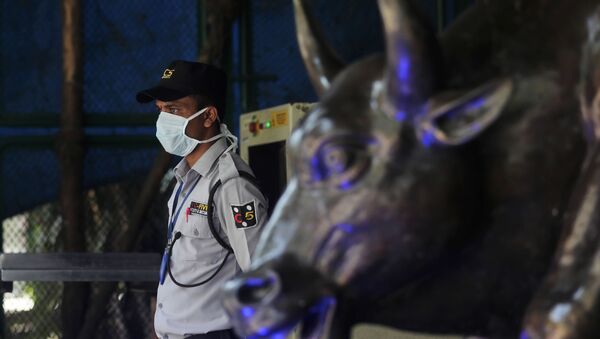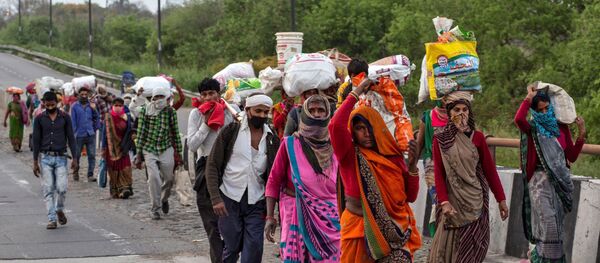Bharatiya Janata Party (BJP) member and Maharashtra state’s former finance minister Sudhir Mungantiwar has said blanket rate cut in goods and services tax will not work.
The statement holds significance as it comes at a time when Indian industry is eagerly awaiting a stimulus package from the government to fight off the Covid-19 related pandemic. Indian Prime Minister Narendra Modi along with his senior cabinet ministers is personally overseeing the details of the stimulus.
Talking to Sputnik, Mungantiwar instead has reasoned that tax relief should be sector specific and exports related measures need to be taken for industries.
He believes India will have to look for new global markets and work towards export-oriented growth, with the philosophy of zero import and maximum import with enhanced focus on research.
Sputnik: What are the challenges the state economy is faced with due to the Covid-19 pandemic?
Sudhir Mungantiwar: Be it the state, country or the global economy, the challenges are similar in nature. The state’s Gross State Domestic Product (GSDP) and the country’s Gross Domestic Product (GDP) are at stake due to the one-month lockdown. The contribution of manufacturing, services, commerce and agriculture to the GSDP will be severely impacted. In Maharashtra, in the last five years the BJP had added almost $131.57 billion to the state’s GSDP. In the financial year 2020-21, in our estimation GSDP would have been about $421 billion from the four key sectors. This translates into a monthly GSDP of $37.63 billion and daily $3.13 billion only from these sectors. So, this is the overall account of losses being faced due to the lockdown which has been in place since March 23. The challenge is to now rejuvenate manufacturing, services, commerce, and agriculture.
Sputnik: What should be the roadmap for these sectors’ revival after the lockdown?
Sudhir Mungantiwar: For the services sector, which accounts for the maximum contribution to the states’ earnings, not much needs to be done. We will have to give some concessions. While giving a fillip to the sector, we need to also plan about the expansion of the service sector. One prominent thing has emerged in the fight against the Covid-19 pandemic. Across the world, there are concerns and dislike about the conduct of China. At this point in time, India will have to see how India can enhance its export of services for the benefit of the world economy. Even though this is the responsibility of the Indian government, the Maharashtra government must also share its responsibility, as the state’s contribution to the national GDP is 15 percent. The state, in coordination with the Central government, needs to strategise on capitalising the global service sector opportunities.
Sputnik: Industries across the country are shut down. What will be the impact and what kind of initiatives need to be taken by the government to revive them in the aftermath of the lockdown?
Sudhir Mungantiwar: The industrial contribution of Maharashtra is to the tune of 20 percent of the entire country. The impact of Covid-19 on industries has to be taken very seriously. The impression that the industries are flush with capital and do not need assistance is a misnomer. A number of industries will face a lot of challenges in the wake of the pandemic. While their revenues and profitability have vanished, they have to service the debt. The closure of industries for three months would mean that they won’t be able to pay their debt liabilities. The strategy should be to immediately handhold the export-oriented industries. For industries, the biggest problem is cash flow and working capital. Concessional loans need to be provided to industry. Most important is an integrated approach towards industrial growth in line with global demand. Additionally, we have to boost research across sectors in the country. That is where we are lacking right now.
Sputnik: What relief measures can the government provide for the other critical sectors?
Sudhir Mungantiwar: Both state government and the central government will have to jointly provide relief measures. The issues are being politicised by quoting the undue amount of the relief package. People should come forward with clear numbers. For example, any package related to agriculture, the state governments need to provide cash transfers directly to the farmers like the state government. This will benefit at least 10.7 million farmers in the state of Maharashtra itself. One very important thing is that agricultural loan waivers benefit the banks, and is only a secondary stimulus to direct cash transfers. Secondly, for agriculture, export hurdles need to be removed. A task force for identifying global demand for agricultural products and ensuring smooth logistics for their exports needs to be set up. India has got a maximum number of farmers and vast cultivable land. Still, we are not in the top five agricultural exporters. Also, last but not the least, the agricultural universities will have to be given huge support.
Sputnik: One major issue is the problems faced by small and medium enterprises. Small scale industries have been completely marooned. What possible policy interventions could there be?
Sudhir Mungantiwar: We need to tap a cluster-based approach for export-oriented growth of small scale industries. Self-sufficient community production of local needs for consumption within the community could also be one of the options. Local production and local consumption are key.
Sputnik: Industry is demanding a 50 percent reduction in goods and service tax. Do you think it is a viable option?
Sudhir Mungantiwar: I feel that an all-encompassing tax cut will not lead to a demand boost. A direct tax benefit will work more in my opinion. With cash in people’s hands, they will consume more. Even if tax has to rationalised, it has to be done as a part of an integrated plan. For example, if to boost agriculture, a tax-reduction is done for agriculture equipment, it could be a good strategy. A blanket tax cut may become counterproductive. However, a targeted tax cut may work. At the end of the day, the government also needs revenue to run the number of social as well as economic benefit schemes.






